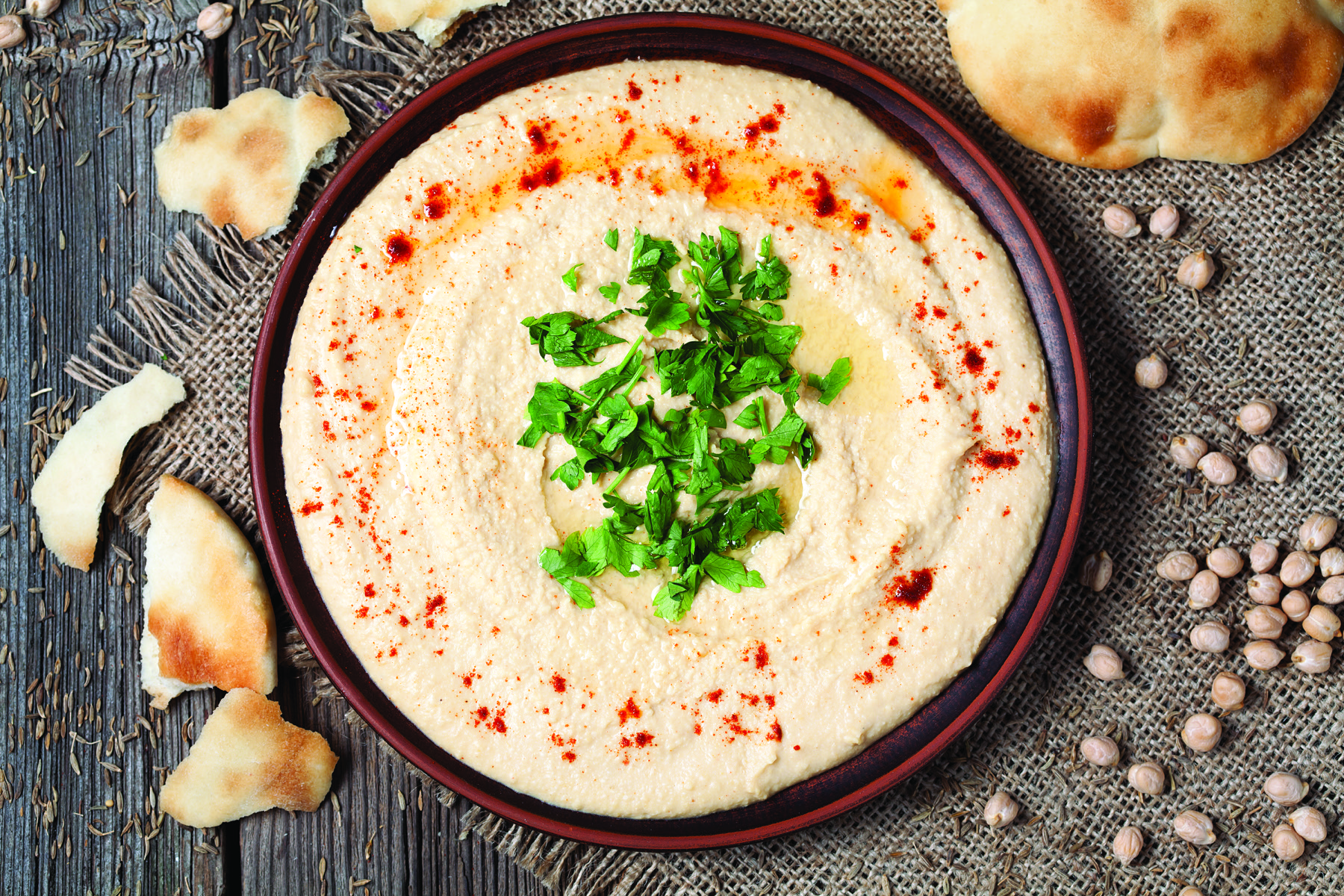 Plate of healthy hummus, creamy vegetarian food with chick-peas, paprika, olive oil and pita flatbread
Plate of healthy hummus, creamy vegetarian food with chick-peas, paprika, olive oil and pita flatbread Every Friday, my mother and her 11 brothers and sisters have lunch at my grandmother Hela’s home in Petah Tikva.
There, they find dozens of pots simmering on stoves filled with various dishes that had been prepared with love all day — some even overnight. These Fridays, my grandmother serves her famous kubbah, a Mizrahi dish that takes hours to prepare. Each grandson picks his kubbah’s flavor: okra, pink beets, pumpkin, spicy kubbah and more.
My grandmother always insists on sending my mother home with a bag of homemade hummus, amba (Iraqi spicy mango spread), hard-boiled eggs, fried eggplants and arok, (fried vegetable patties.) On Shabbat morning, we stuff all of these flavors into pita bread, creating a sabich, a traditional Iraqi Jewish sandwich.
My Iraqi mother honors her mother by cooking traditional Iraqi Jewish dishes.
She has this in common with my Tunisian father and his 15 siblings, who also prepare their grandmother’s North African Jewish recipes.
Recently, anti-Israel activists launched a campaign to obliterate my grandmother’s Shabbat lunches. Or so it felt that way.
This attack was in reaction to a post on a website called Hey Alma, which asked people to announce their “unpopular Jewish food opinions.”
“No such thing as Israeli cuisine!” posted one Ashkenazi Jew. “Israeli salad and Israeli couscous aren’t Israeli, they’re Arab foods that have been culturally appropriated,” wrote another Ashkenazi anti-Zionist, receiving more than 1,000 “likes.”
By declaring Israeli cuisine doesn’t exist, these anti-Zionists are stealing Mizrahi recipes and delivering them to regimes that ethnically cleansed us.
Saying Israel has no food or culture is the politically correct way of being racist toward Mizrahim.
After the majority of Mizrahi Jews fled for their lives to escape anti-Semitic regimes throughout the Middle East, they resettled in Israel. We identify our food as Israeli because as members of the Jewish state we can cook it without the fear of being massacred.
Now anti-Zionists proclaim that our cuisine is stolen from the Arab world.
This claim is laughable at its core; the Arab world is an imperial-colonial project designed to erase minorities and their culture in the Middle East and North Africa. The land where my grandmother learned to cook with her grandmother was not Arab — it was once a multi-ethnic state.
But in their quest to strip Israel of its culture, these activists dubbed my grandma’s recipes that she brought from Baghdad as appropriated from the Arab world that butchered her family.
By accusing Mizrahi Jews of cultural appropriation, these extremists essentially deny 53% of Israeli Jews who came to Israel from the Middle East and North Africa, the right to partake in our heritage. It is racism and anti-Semitism for the price of one.
Saying Israel has no food or culture is the politically correct way of being racist toward Mizrahim. These bigots aren’t just stealing our culture, they are claiming we have none.
It’s not the first time Hey Alma contributed, deliberately or not, to this anti-Mizrahi erasure. The website frequently posts about Ashkenazi food and culture but seldom posts about Mizrahim, our food, or our heritage.
The goal of this campaign? Dehumanization. No nation lacks cuisine. Deprive Jews and Israelis of a culture, and you deprive us of our humanity.
Perhaps that is the root of the divide between some American Jews and Israelis: apathy via dehumanization.
American Jews become anti-Zionists because they struggle to empathize with Israelis. They wish we ate bagels and lox instead of hummus and sabich, listened to Barbra Streisand and not Omer Adam. They are alienated by how Israel, unlike most American Jewish spaces, adopts Mizrahi culture. They wish our national language was Yiddish and not Hebrew and Arabic, that we cared more about their interpretation of tikkun olam instead of our survival.
Along with dishes from all global Jewry, Mizrahi cuisine is a part of the emerging Israeli cuisine, and that’s a hard fact for anti-Zionists to swallow.
Hen Mazzig is an Israeli writer, speaker and activist. He is a senior fellow at the Tel Aviv Institute. Follow him: @HenMazzig























 More news and opinions than at a Shabbat dinner, right in your inbox.
More news and opinions than at a Shabbat dinner, right in your inbox.